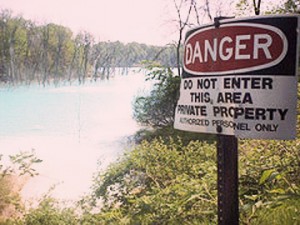DEP Orders Shut Down of Country's Largest Coal Ash Pond
On Friday, the Pennsylvania Department of Environmental Protection filed a lawsuit and consent decree in federal court seeking to shut down a coal ash dump on the border of Pennsylvania and West Virginia. First Energy’s Little Blue Run coal ash impoundment pond in Beaver County takes toxic sludge from the company’s Bruce Mansfield coal burning power plant in Shippingport, Pa.
Problems with the pond, which encompasses almost 800 acres on a 1700 acre site, date back to the 1970s. Viewed from space, the pond looks a metallic turquoise blue. The unlined impoundment has resulted in leaks of heavy metals such as arsenic and selenium, causing damage to drinking water supplies and nearby surface water.
“This proactive move is aimed at addressing comprehensively for the future long-standing matters about the Little Blue Run impoundment,” DEP Secretary Mike Krancer said in a statement. “We believe this will not only make major strides in environmental projects for that area, but also bring peace of mind to many residents who have expressed concerns about the Little Blue Run impoundment.”
The consent decree requires First Energy to submit a plan to close the plant by the end of 2016. The company will also have to pay a fine of $800,000, supply 21 households with hook-ups to municipal water systems, and conduct an environmental impact study on the area.
Environmentalists praised the action.
“For years, we have known that the toxic coal ash in Little Blue Run was poisoning our drinking water and our environment,” said Curt Havens, vice president of the Little Blue Regional Action Group. “We appreciate that the PA DEP appears to be taking action to stop FirstEnergy from continuing to pollute our community, and we are going to continue to work to ensure that all current sources of pollution from this site are cleaned up and all future contamination is prevented.”
Two public interest law firms had sent a letter of intent to sue First Energy over Little Blue Run several months ago, if the Department of Environmental Protection did not take action.
Richard Webster is an attorney with Public Justice, which along with the Environmental Integrity Project, planned to file a lawsuit.
“So far the approach has been to chase the pollution plume rather than prevent the pollution from happening,” said Webster. “So I was really skeptical about whether DEP was really taking decisive action. I have to say, reading the details of the agreement,… it’s a really good start. I’m pleasantly surprised.”
Webster calls unlined coal ash ponds “dinosaurs of the past that should be extinct.” He says his organization chose to target Little Blue Run because it’s the largest coal ash disposal impoundment in the country. Webster says the decision by DEP should serve as a precedent for shutting down other sites nationwide.
The Environmental Protection Agency has recently set new air emission standards for coal fired plants. But regulation of the coal ash impoundments still remains with the states.
Mark Durbin, a spokesman for First Energy, says the consent agreement with the DEP indicates that’s where the authority should remain.
“What this consent decree does is it reinforces the fact that states are capable of regulating these coal combustion by-products, as a residual waste,” says Durbin. “Rather than having to label it as a hazardous waste, which is what some environmental groups are pushing.”
Durbin says First Energy disagrees with some environmentalists’ assertions that Little Blue Run caused environmental damage.


















